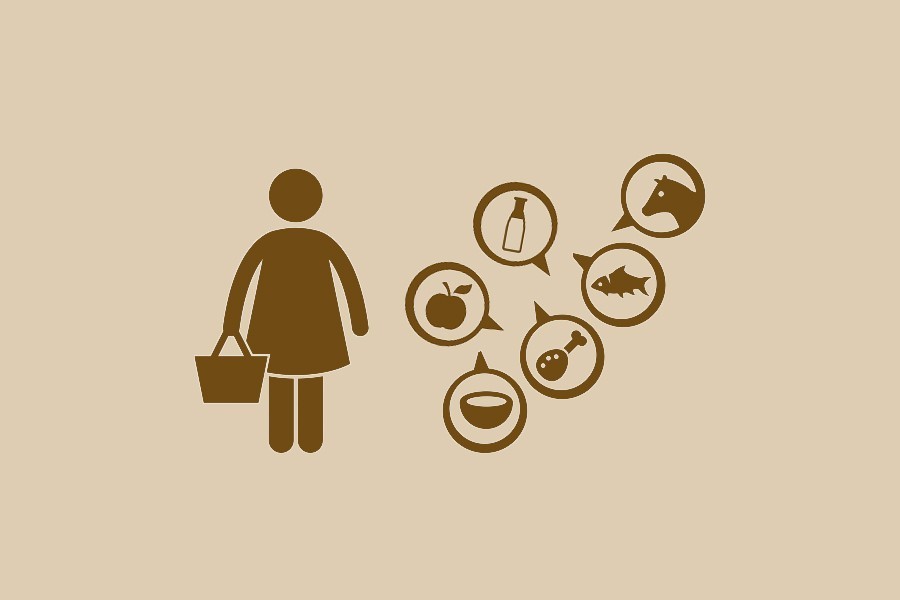Inflation down marginally from a decade high
Sept data down to 9.1pc from Aug peak at 9.8pc

Published :
Updated :

Soaring inflation descended to 9.1 per cent in September from a decade-high 9.8 per cent in August by official count, under sobering impact of slowly improving global supply system.
Planning Minister MA Mannan told the FE Wednesday that the August figure, 9.8 per cent, was the highest after the year 2011, pushed by the fallout from Ukraine war.
Bangladesh Bureau of Statistics (BBS) data show that the point-to-point inflation was the highest 11.40 per cent in 2011.
As a result of high inflation, economists say, soaring prices of all commodities, including daily necessities, eroded people's purchasing power and made living nearly unaffordable for those in the lowest rung of society.
Two exogenous economic factors-the tapering global pandemic and the Ukraine war on its close heels-were the strongest drivers behind price rises across the world and in Bangladesh under a knock-on effect. Alleged price-fixing on the domestic market by certain oligopolies made the situation far worse.
"As far as my knowledge, the inflation rate increased to 9.8 per cent in August this year which later fell to 9.1 per cent," says Mr Mannan.
The higher prices of rice, soybean oil, vegetables and some other food items have escalated the food inflation, resulting in higher inflationary pressure in the last two months, he adds.
However, the planning minister hopes that the inflationary pressure will be continuing to fall in the current month of October, too, as prices of rice, vegetables and pulses have fallen a bit.
Asked about details of the inflation data: Mr Mannan said: "I am at my village home now. I don't have detailed data in my hand. But we will disclose the figure within a few days."
Planning minister said: "The government's expanded social safety-net programmes like subsidised food and essentials to 1.0 crore (10 million) people have helped to tame the CPI pressure."
Meanwhile, Bangladeshis cannot get rid of the bite of the higher inflationary pressure as the rate of point-to-point inflation started swelling from May this year.
According to the BBS, the inflation rate started rising to seven-percent club in May (7.42 per cent) from the 6.0-percent trajectory in the previous months of the year.
The point-to-point inflation till July had also maintained its trend within the "seven-percent club" which suddenly jumped to 9.8 per cent in August and 9.1 per cent in September. The government targeted to keep the inflation within 5.6-percent limit in the current FY2022-23.
The average inflation rate in the last fiscal year (FY) 2021-22 was recorded at 6.15 per cent, same as the previous FY2021, the BBS data show.
Earlier, development partners and local economists had forecast that Bangladesh's inflationary pressure would be rising in the coming days due to the impact of the Russia-Ukraine war and internal demand-supply mismanagement.
They said it would be very challenging for the government to tame the inflationary pressure as it is expected to be higher in the days ahead.
People, especially those in the middle-and lower-income groups, have already been struggling with higher prices of essentials over the months as rice, flour, pulses, sugar, cooking oils, and vegetables maintained higher rates at retail markets.
Centre for Policy Dialogue (CPD) Research Director Dr KG Moazzem said they were forecasting earlier that point-to-point inflation rate might go up to as high as double-digit figures in the last couple of months.
"Ultimately, the inflation data in August and September proved our assumptions. But we should not be complacent that it will be declining in the coming months as Bangladesh's inflation is mostly the import-driven."
He said: "Since the oil and food prices on the global market are still high and the Russia-Ukraine war is continuing, we should not assume that the inflation will be declining. Better we should go for managing the inflation."
In that case, the government should expand its social safety-net recipes, ration-card and open- market sale (OMS) for easing the impact of the inflationary pressure on the poor and vulnerable groups of people.


 For all latest news, follow The Financial Express Google News channel.
For all latest news, follow The Financial Express Google News channel.